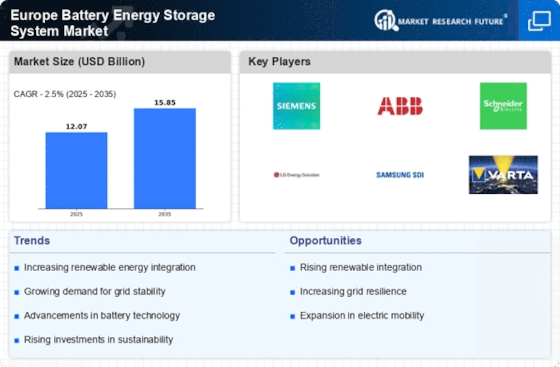Market Trends
Key Emerging Trends in the Europe Battery Energy Storage System Market
The European battery energy storage system (BESS) market is experiencing significant growth as the continent moves towards renewable energy integration and decarbonization efforts. Market trends indicate a robust expansion driven by several factors. Firstly, the increasing adoption of intermittent renewable energy sources like wind and solar power necessitates the need for energy storage solutions to stabilize the grid and ensure reliable power supply. BESS provides a means to store excess energy generated during peak production periods for use during times of high demand or low renewable generation.
Furthermore, supportive government policies and regulations aimed at promoting clean energy technologies are driving the growth of the BESS market in Europe. Initiatives such as subsidies, feed-in tariffs, and targets for renewable energy deployment incentivize investment in battery storage projects. Additionally, regulatory frameworks promoting energy market liberalization and grid modernization create favorable conditions for the integration of BESS into the existing energy infrastructure.
The declining costs of battery technologies, particularly lithium-ion batteries, are also fueling market expansion. Technological advancements, economies of scale, and increased manufacturing capacity have led to significant cost reductions in battery production, making BESS more economically viable for a wide range of applications. As a result, businesses, utilities, and households are increasingly investing in battery storage systems to reduce energy costs, improve grid resilience, and enhance energy independence.
Moreover, the growing awareness of the environmental benefits of energy storage solutions is driving consumer demand and industry investments. BESS plays a crucial role in reducing greenhouse gas emissions by enabling the integration of more renewable energy into the grid and facilitating the transition away from fossil fuels. As concerns about climate change intensify, there is a growing emphasis on sustainability, prompting businesses and governments to prioritize clean energy technologies like BESS.
Another significant trend in the European BESS market is the increasing focus on grid flexibility and energy system optimization. Battery storage systems offer fast response times and flexibility in adjusting to fluctuations in supply and demand, thereby enhancing grid stability and reliability. This flexibility is particularly valuable in managing the variability of renewable energy resources and mitigating the challenges associated with their intermittent nature.
Furthermore, the rise of distributed energy resources (DERs) and the proliferation of electric vehicles (EVs) are creating new opportunities for BESS deployment. Integrating battery storage with solar panels, wind turbines, and EV charging infrastructure enables synergies between these technologies and enhances their overall efficiency and effectiveness. As the adoption of DERs and EVs continues to grow, the demand for BESS to support their integration into the grid is expected to increase significantly.
The European battery energy storage system market is witnessing robust growth driven by factors such as the transition to renewable energy, supportive government policies, declining battery costs, environmental awareness, grid flexibility needs, and the rise of distributed energy resources and electric vehicles. As the energy landscape continues to evolve, BESS will play an increasingly critical role in enabling the transition to a cleaner, more resilient, and sustainable energy future in Europe.



















Leave a Comment